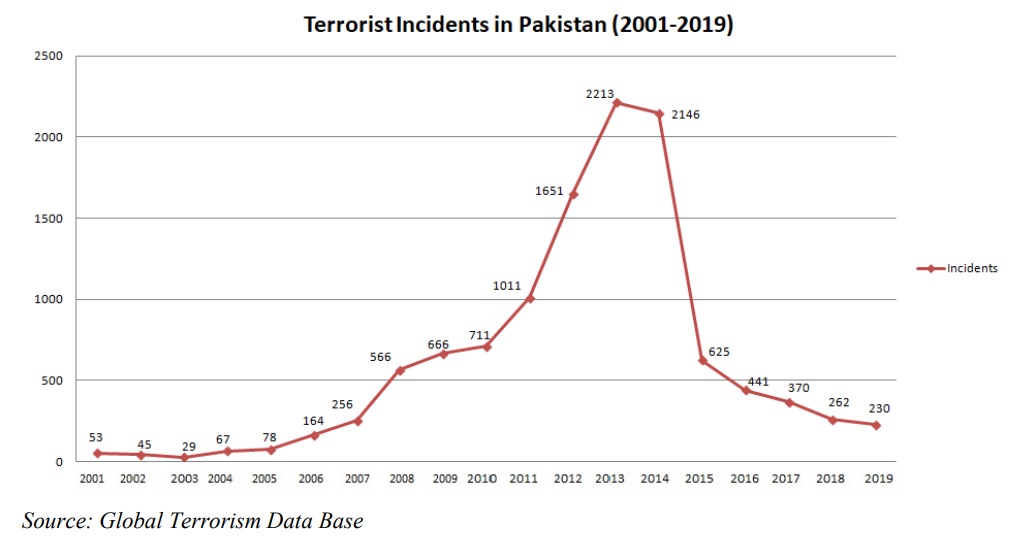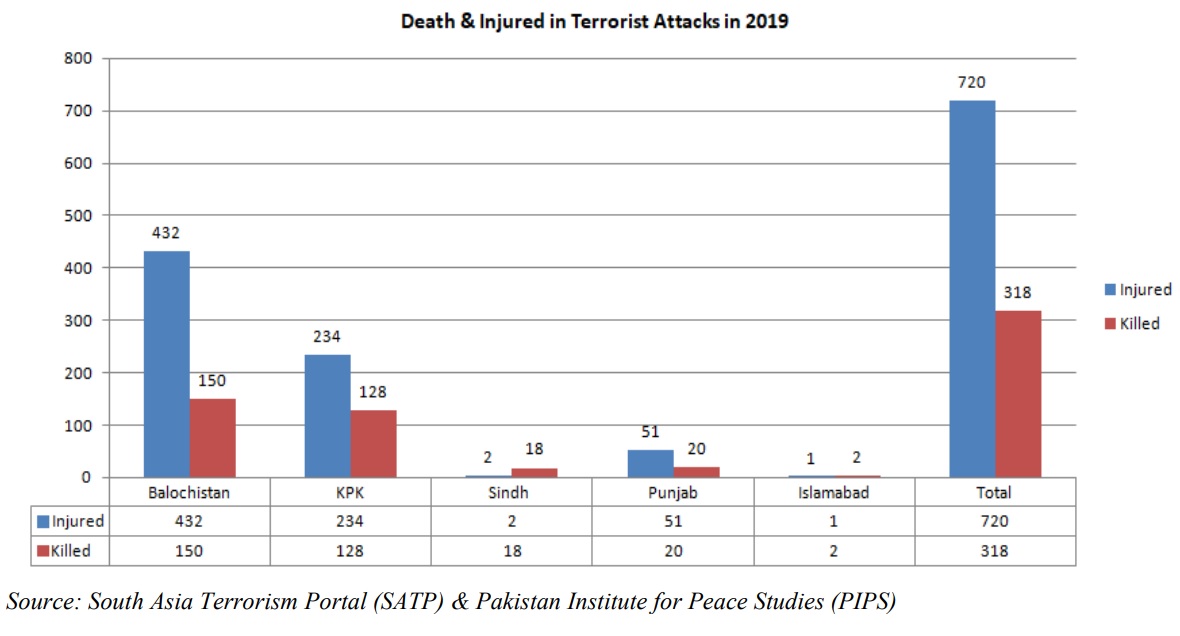ISLAMABAD, Pakistan: A drastic decline in suicide attacks was witnessed in the outgoing year 2019 as only four suicide attacks occurred during the year as compared 11 suicide attacks in 2018, lesser frequency of attacks showed that anti-terrorism operations have made it difficult for the terrorist groups to carry out large scale attacks in Pakistan.
According to a study by the Islamabad Policy Institute (IPI) on the security situation in Pakistan during 2019, only four suicide attacks occurred during the year – Loralai (January 29), Quetta (April 12), Lahore (May 8), and Dera Ismail Khan (July 21). Two of these attacks that took place in Loralai and DI Khan were claimed by the outlawed Tehreek-i-Taliban Pakistan (TTP) while one each in Quetta and Lahore were claimed by ISIS/LeJ nexus and Hizbul Ahrar (HuA).
The study showed that although terrorist groups still consider suicide bombing as the most lethal and effective weapon for causing intimidation; however the major reason behind the 36% reduction in the overall casualty figure for terrorism incidents in a year including both dead and injured could be the successes of counter-terrorism operations that have made it difficult for the terrorist groups to carry out attacks.
The study revealed that the number, scale and lethality of terrorist incidents decreased further during 2019 as Pakistan continued its march towards peace and stability; however, challenges to achieving sustainable peace persisted during the year.
According to the study, a total of 230 terrorism incidents were reported from across the Country during 2019 in which 318 people lost their lives while another 720 were wounded.
Number of terrorist attacks in Pakistan declined by 13%
The statistics for 2019 showed a decline in number of terrorist attacks by nearly 13% as compared to 2018 when 262 attacks took place. Similarly, the fatalities and the number of wounded in terrorist attacks went down by 46% and 30% respectively over the previous year.

A breakdown of the fatalities revealed that almost an equal number of civilians and security forces/LEAs personnel lost their lives to terrorist attacks – 160 civilians and 158 personnel of security forces/LEAs.
The improvised Explosive Devices (IEDs) and firing with weapons was the most common mode of attack adopted by the terrorists in 2019.
Continuing with previous trends, most of the terrorism incidents occurred in Khyber-Pakhtunkhwa and Balochistan provinces, which suffered 124 and 84 attacks respectively. Meanwhile, Sindh faced 15 attacks and Punjab 06. As per the trend recorded during the year, Balochistan saw a 26% decline in incidence of terrorist attacks as compared to the preceding year, whereas in KP and Punjab the prevalence remained almost the same with slight variation. Worryingly, Sindh witnessed a marginally increasing trend of terrorism incidence this year. Islamabad, meanwhile, remained the safest place with just one incident.

A total of 130 attacks perpetrated by religiously motivated groups TTP, HuA, Jamaat-ul-Ahrar (JuA), Local Taliban factions, ISIS and affiliated organizations made up 56% of the total incidents.
Meanwhile, nationalist insurgent groups including Balochistan Liberation Army (BLA), Bloch Republic Army (BRA), Balochistan Liberation Front (BLF), Lashkar-e-Balochistan, Baloch Raji Aajoi Sangar (BRAS), and Sindhudesh Liberation Front Army (SDLF/SDLA) claimed 59 attacks accounting for 25 percent of total terrorist strikes. Sectarian related incidents made up for almost 6.5 % of the total attacks. The origin of 26 incidents remained unknown.
The gradual progress towards elimination of terrorism as having been witnessed over the years is satisfactory but the continued presence of religiously motivated, sectarian and nationalist terrorist groups in terms of organization and the fact that they have been able to retain significant operational capacity is worrisome. These groups are adapting to counter-terrorism actions and coming up with newer strategies to survive like formation of alliances and sharing of resources.
The lack of counter-terrorism cooperation with Afghanistan and border security issues with Iran have also contributed to complicating the effort to tackle terrorism. Focus on dealing with extremism remained inadequate. The policy makers and security agencies, moreover, need to urgently focus on the looming threat of cyber-terrorism.
